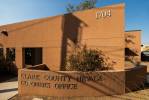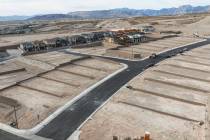Nevada high court: Super priority lien extinguishes first deed of trust

CARSON CITY — The Nevada Supreme Court on Thursday ruled that a super priority lien held by a homeowners association can extinguish a first deed of trust on a property, a decision that will create a windfall for some real estate investors in Las Vegas who picked up properties for pennies on the dollar.
But in what could be an even more significant consequence of the opinion, Las Vegas attorneys Puoy Premsrirut and James Adams say the court also clarified a long-standing dispute over what can be included in such a super priority lien.
The debate has been about whether it can include costs and fees associated with recovering the unpaid assessments, including costs incurred by collection companies hired by the HOAs. Homeowners associations have argued that the fees are recoverable under the lien, while those who have purchased foreclosed homes argue only nine months of unpaid dues can be included.
Premsrirut said the decision is clear that such liens can consist of nine months of homeowner association assessments and no more.
“We interpret the ruling to say that the Supreme Court is stating that the super priority lien is a cap, a formula, limited to nine months of assessments and no more,” she said.
This super priority lien issue was argued before the Supreme Court earlier this year, and a decision has not yet been issued. But Adams said he expects that ruling, when it comes, will simply affirm what the court already said on Thursday.
The attorneys represent investors who have rejected the notion that the super priority lien can consist of anything other than the nine months of assessments.
“We feel we can take this decision to a district court judge to determine that the super priority lien is a limited figure equaling nine months of assessments,” Adams said.
The factual question in the Thursday opinion, however, is a victory for a group of real estate investors called SFR Investments Pool 1, which foreclosed on a super priority lien held by the Southern Highlands Community Association on a home in 2012 for $6,000. The investors argued in the case that the foreclosure wiped out a debt of $885,000 on the property, which was held by U.S. Bank as a first deed of trust.
The court, in an opinion written by Justice Kristina Pickering, agreed with SFR Investments.
“With limited exceptions, this lien is ‘prior to all — other liens and encumbrances’ on the homeowner’s property, even a first deed of trust recorded before the dues became delinquent,” the opinion says.
The holding by the court that the lien is a “true” super priority lien was supported by the full court.
But four members of the court also held that such super priority liens can be extinguished through a nonjudicial foreclosure process, which was used in this case for the home located at 11577 Capanna Rosso Place. The three dissenting justices agreed that the lien established by the Legislature is a true super priority lien but argued that a civil judicial process was necessary to extinguish a first deed of trust rather than a nonjudicial process.
U.S. Bank challenged the super priority foreclosure and won in Clark County District Court, causing SFR Investments to appeal.
In its brief filed with the Nevada Supreme Court, attorneys for the bank argued that neither state law governing common-interest communities nor public policy, “justifies giving SFR such a tremendous windfall.”
The brief from the bank also argued that if a lender cannot adequately protect its substantial residential loan investment, the lender will either cease lending in Nevada or charge higher interest rates to protect itself against greater uncertainty of the borrower’s repayment of the loan.
“In addition, if the court finds SFR’s position persuasive, it would reward speculators purchasing valuable real estate properties for pennies on the dollar. Our state’s housing sector can ill-afford another speculator-generated shock,” the bank said in its brief.
Jonathan Friedrich, a member of the board of the Commission for Common-Interest Communities and Condominium Hotels, called the ruling a potential disaster for the residential real estate business in Southern Nevada.
“If a bank cannot protect its investment then what bank or lending institution would ever lend money in this state,” he said. “It will hurt homebuilders and resales and be disastrous to our economy.”
But Marilyn Brainard, a member of the board of the Wingfield Springs Community Association in Sparks, called the ruling a positive one for homeowners associations.
Banks did not always step up and foreclose on homes so that associations could get the assessments they need to maintain their communities, she said.
“They did not play their part,” Brainard said. “The banks wanted to keep their stake in the properties but would not help maintain their value.”
Adams said there were a number of real estate investors who adopted the strategy of paying off the super priority lien with the expectation that the first mortgage would then be extinguished. They will benefit significantly from this decision, he said.
But in any event, the decision clarifies the rules for all those involved, bringing much needed certainty to the process, Adams said.
Pickering, who was joined by Justices James Hardesty, Michael Douglas and Nancy Saitta in support of the overall opinion, said that U.S. Bank’s objection that it was unfair to allow a relatively nominal lien stemming from nine months of HOA dues to extinguish a first deed of trust overlooked the fact that the bank could have paid off the lien to avert the loss.
“The inequity U.S. Bank decries is thus of its own making … ” the majority said.
Contact Capital Bureau reporter Sean Whaley at swhaley@reviewjournal.com or 775-687-3900. Find him on Twitter: @seanw801 on Twitter.


















